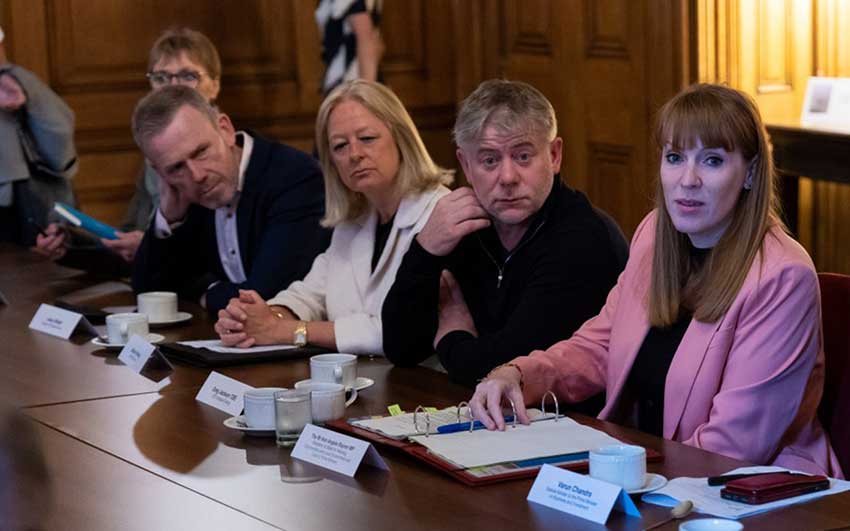How to (finally) end miscommunication at work
As a writer and editor and manager, my job involves words. One of the most important things I need to get right is getting a message across clearly. And yet still, like all humans, every day has moments of crossed wires and misunderstandings. In all jobs—and in all aspects of life—communication is what matters most: It’s how relationships are built and maintained, how ideas get off the ground, and how we understand the world. And, maybe because it’s so critical, it’s so easy to mess up.Here’s how to improve: Become better at listening Charles Duhigg researched why some people are so much better at communicating and connecting than other people. He wrote the book Supercommunicators: How to Unlock the Secret Language of Connection. He says that “super communicators” think about who they’re talking to as much as they’re thinking about what they want to say. In other words, the people who are the best at communicating are the best at listening and are in conversations to better understand the people they are talking to. He outlines a process called “looping for understanding”: Ask a good question. Repeat back what you heard in your own words. Ask if you got it right. Duhigg says the last step is the one most people skip. “Not only does it prove to the other person that I genuinely want to understand what they’re telling me, it shows that I’m genuinely listening,” he says. “Also, if I go into a conversation, knowing that my assignment is to repeat back what you have said, then it gets me to listen more closely.” Overcommunicate to save time It may sound counterintuitive, but time management coach Elizabeth Grace Saunders says that overcommunicating can be more productive and can save you hours of writing lengthy updates or attending status report meetings. Here are two ways she says you can spend a few minutes overcommunicating in order to save much more time on follow-ups: Let people know you got their message. When you get an email, send a two-second acknowledgement like “I got it. Thanks!” or “Received! I’ll be in touch soon.” This helps reassure others that their message did land in your inbox and that you’re aware of their need. Clarify a time frame. When you don’t clearly communicate about your expectations, you could end up with a lot of miscommunication and confusion. For example, you could be planning to get a report to someone by next week, and they might expect it by close of business today. It’s an easy fix to clarify a rough time frame at the start: “I’ll get back to you by tomorrow,” or “I’ll send a draft next week.” Pay attention to your body language and stay present Communication coach Anett Grant says that paying attention to your facial expressions and body language when you’re speaking at work can make a huge difference in your colleagues trusting you. She says the first step is to make sure what you’re thinking matches what you’re saying. For example, if you say, “I’m so excited to be here,” while thinking, “I wish I wasn’t so nervous,” your facial expressions will reflect your feelings, not your words. This can lead to confusion and mistrust. Don’t try to impress with your vocabulary It’s a rule of journalism that I try to remember in all my communication: Don’t use a big word when a simple one makes the same point. It’s a mistake many people make in workplace settings to try to appear smarter. This approach can backfire, as many people admit they use big words that they don’t fully know the meaning of. It can also irritate your audience—or worse, make them tune out. This is especially true for corporate jargon. I guarantee no communication has ever been improved by a promise to “circle back.”

As a writer and editor and manager, my job involves words. One of the most important things I need to get right is getting a message across clearly. And yet still, like all humans, every day has moments of crossed wires and misunderstandings.
In all jobs—and in all aspects of life—communication is what matters most: It’s how relationships are built and maintained, how ideas get off the ground, and how we understand the world. And, maybe because it’s so critical, it’s so easy to mess up.
Here’s how to improve:
Become better at listening
Charles Duhigg researched why some people are so much better at communicating and connecting than other people. He wrote the book Supercommunicators: How to Unlock the Secret Language of Connection.
He says that “super communicators” think about who they’re talking to as much as they’re thinking about what they want to say. In other words, the people who are the best at communicating are the best at listening and are in conversations to better understand the people they are talking to. He outlines a process called “looping for understanding”:
- Ask a good question.
- Repeat back what you heard in your own words.
- Ask if you got it right.
Duhigg says the last step is the one most people skip. “Not only does it prove to the other person that I genuinely want to understand what they’re telling me, it shows that I’m genuinely listening,” he says. “Also, if I go into a conversation, knowing that my assignment is to repeat back what you have said, then it gets me to listen more closely.”
Overcommunicate to save time
It may sound counterintuitive, but time management coach Elizabeth Grace Saunders says that overcommunicating can be more productive and can save you hours of writing lengthy updates or attending status report meetings.
Here are two ways she says you can spend a few minutes overcommunicating in order to save much more time on follow-ups:
- Let people know you got their message. When you get an email, send a two-second acknowledgement like “I got it. Thanks!” or “Received! I’ll be in touch soon.” This helps reassure others that their message did land in your inbox and that you’re aware of their need.
- Clarify a time frame. When you don’t clearly communicate about your expectations, you could end up with a lot of miscommunication and confusion. For example, you could be planning to get a report to someone by next week, and they might expect it by close of business today. It’s an easy fix to clarify a rough time frame at the start: “I’ll get back to you by tomorrow,” or “I’ll send a draft next week.”
Pay attention to your body language and stay present
Communication coach Anett Grant says that paying attention to your facial expressions and body language when you’re speaking at work can make a huge difference in your colleagues trusting you.
She says the first step is to make sure what you’re thinking matches what you’re saying. For example, if you say, “I’m so excited to be here,” while thinking, “I wish I wasn’t so nervous,” your facial expressions will reflect your feelings, not your words. This can lead to confusion and mistrust.
Don’t try to impress with your vocabulary
It’s a rule of journalism that I try to remember in all my communication: Don’t use a big word when a simple one makes the same point. It’s a mistake many people make in workplace settings to try to appear smarter.
This approach can backfire, as many people admit they use big words that they don’t fully know the meaning of. It can also irritate your audience—or worse, make them tune out. This is especially true for corporate jargon. I guarantee no communication has ever been improved by a promise to “circle back.”






















